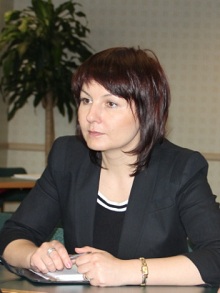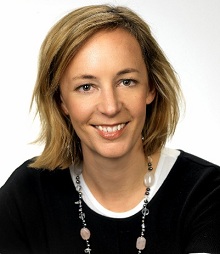 |
Monday, September 3rdDona Scola, Deputy Minister, Ministry of Information Technology and Communications of the Republic of Moldova
Title: |
SPEAKER BIOGRAPHY.
On November 20, 2009, Mrs. Dona Școla was appointed as a Deputy Minister of Information Technology and Communications, with the main task to design policies, together with the Ministry’s team, to boost use of ICT, increase ICT competitiveness and integrate Moldova in global ICT value chain.
Since February 2010, Moldova benefits of the World Bank e-Transformation initiative, and Mrs. Dona Școla has helped lay the foundations for the National e-Governance Transformation Agenda, which has two main purposes: increasing performances of state institutions and public authorities at central and local levels, and developing some quality public services in electronic format, which shall simplify citizens’ lives.
Having about 20 years of managerial experience in the field of communications and IT, Mrs. Dona Scola, has lead one of the pioneering ISPs in Moldova, contributing for Internet development and broadband deployment in the country. She worked as a consultant for several ICT sector development projects financed by the World Bank, USAID, Soros Foundation and other partners. She has extensive experience in facilitative management, project and business development, holding the MBA degree from Grenoble Graduate School of Business and university degree in system engineering from Technical University of Moldova.
In addition to her two native languages (Romanian and Russian) she also speaks English fluently.
 |
Tuesday, September 4thGeorg Gottlob, Vienna University of Technology and Oxford University
Title: |
ABSTRACT:
What if you could turn all websites of an entire domain into a single database? Imagine all real estate offers, all airline flights, or all your local restaurants’ menus automatically collected from hundreds or thousands of agencies, travel agencies, or restaurants, presented as a single homogeneous dataset. Historically, this has required tremendous effort by the data providers and whoever is collecting the data: Vertical search engines aggregate offers through specific interfaces which provide suitably structured data. The semantic web vision replaces the specific interfaces with a single one, but still requires providers to publish structured data. Attempts to turn human-oriented HTML interfaces back into their underlying databases have largely failed due to the variability of web sources.
In this talk, we demonstrate that this is about to change: The availability of comprehensive entity recognition together with advances in ontology reasoning have made possible a new generation of knowledge driven, domain-specific data extraction approaches. To that end, we give an overview of DIADEM, the first automated data extraction system that can turn nearly any website of a domain into structured data, working fully automatically, and present some preliminary evaluation results (see also http://diadem.cs.ox.ac.uk/ ). This talk describes joint work with Tim Furche and Christian Schallhart, as well as with all other members of the DIADEM Team.
SHORT BIO:
Georg Gottlob is a Professor of Informatics at Oxford University, a Fellow of St John's College, Oxford, and an Adjunct Professor at TU Wien. His interests include data extraction, database theory, graph decomposition techniques, AI, knowledge representation, logic and complexity. Gottlob has received the Wittgenstein Award from the Austrian National Science Fund, is an ACM Fellow, an ECCAI Fellow, a Fellow of the Royal Society, and a member of the Austrian Academy of Sciences, the German National Academy of Sciences, and the Academia Europaea. He chaired the Program Committees of IJCAI 2003 and ACM PODS 2000, was the Editor in Chief of the Journal Artificial Intelligence Communications, and is currently a member of the editorial boards of journals, such as CACM, JCSS, and Transactions on Large-Scale Data- and Knowledge-Centered Systems. He is the main founder of Lixto (www.lixto.com), a company that provides tools and services for web data extraction. Gottlob was rexcently awarded an ERC
Advanced Investigator's Grant for the project "DIADEM: Domain-centric Intelligent Automated Data Extraction Methodology" (see also http://diadem.cs.ox.ac.uk/) . More information on Georg Gottlob can be found on his Web page: http://www.cs.ox.ac.uk/people/georg.gottlob/
 |
Wednesday, September 5thYamine Ait-Ameur , INPT-ENSEEIHT/IRIT, Toulouse, France
Title: |
SHORT BIO:
Yamine AIT AMEUR is full professor at the Polytechnique National Institute in Toulouse (INPT-ENSEEIHT). He is a member of the ACADIE research team at IRIT research institute in Toulouse. Formal methods, ontology based data modeling and database are his main topics of interest. Formal modelling is in the heart of his research activities. He has participated and led several research national and international projects written a couple of research papers and supervised several PhD thesis.His research results have been applied in various engineering areas like aeronautics, embedded systems and petroleum industry.
 |
Thursday, September 6thSarah Spiekermann, Vienna University of Economics and Business, Austria
Title: |
ABSTRACT.
The keynote talk will reflect on the evolution of personal data markets and peoples' desire to participate in them. This evolution will be discussed in the light of the new data protection regluation draft. How will the two opposing sides be able to reconcile?
SPEAKER BIOGRAPHY.
Sarah is a professor for Information Systems since 2009 and chairs the Institute for Management Information Systems at Vienna University of Economics and Business (WU Wien). Before tenured in Vienna, she was assistant professor at the Institute of Information Systems at Humboldt University Berlin (Germany) and held an Adjunct Professor positions with the Heinz College of Public Policy. Sarah has published over 70 articles in leading IS, marketing and computer scienice conferences and journals, in particular in the domain of electronic privacy and electronic marketing. The key goal of her work is to investigate the importance of behavioral constructs and social values for IT design and to refine the concept of ethical computing in an E-Society.
